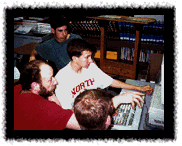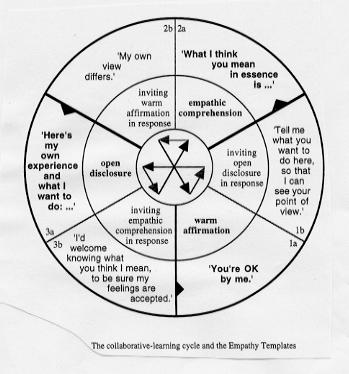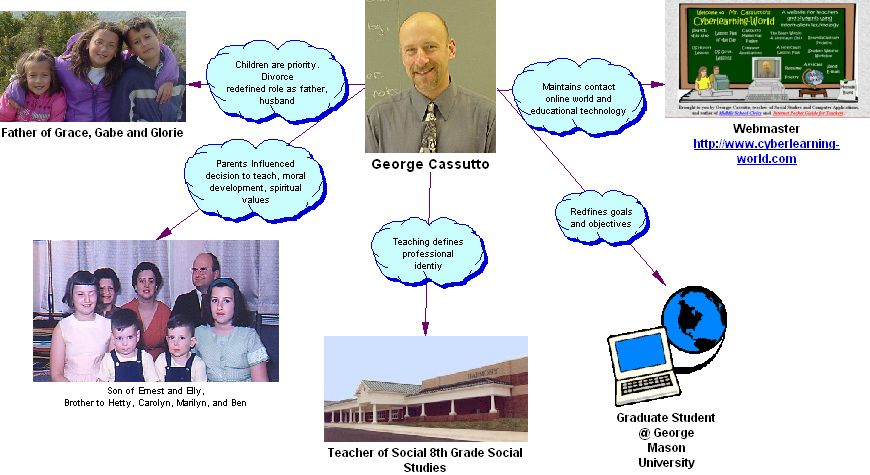Evidence of Analytical and
Integrative Thinking
Fall Semester, 2004
EDCI 797d - Best Practices in the
Content Fields
Learning How To Be an Online
Learner
| One of the primary objectives of the
Graduate School of Education's Virtual High School program is to train educators
to become online mentors who can guide student through their studies
successfully. The mentor is that part of the Community of Practice
Learning System (COPLS) that guides the online learner thought the course,
providing feedback, structure, and motivation. The mentor is the expert in the
content field that the learner turns to for clarification in both content and
process. The mentor knows the topic intimately, most likely because the mentor
was instrumental in developing the course content. |
| The mentor is the expert in the
content field that the learner turns to for clarification in both content and
process. The mentor knows the topic intimately, most likely because the mentor
was instrumental in developing the course content. |
|
The participants in the Virtual High
School program must learn how to be a mentor for adolescents that will sign on
to the Virtual High School. They gain this knowledge by becoming on-line
learners themselves. As they move through The Online Academy For Teachers
(TOAT), teachers discuss their course content with those classmates who have
advanced far enough in the program to be mentors for their colleagues. Teachers
make themselves available to chat on-line regarding course content on how to be
a mentor to young people. Teachers also respond to course content submitted to
them via email forms and direct email. TOAT participants also meet directly with
their mentors during class time to coordinate activities and provide mutual
support.
The Role of the Mentor in
Online Learning
Becoming a mentor is a serious
responsibility that requires a high level of self-awareness. In order to
help a young person through the challenges of online learning, you have to have
your own emotional and academic house in order. You must know how to be a good
time budgeter. Self-regulation must be a something you know how to do without
question. Most importantly, you must understand what it is like to be an online
learner, empathizing and sometime sympathizing with the experiences, challenges,
and achievements of the computer-based and Internet-assisted learner. The issues
that you face as an educator and as a human being will become evident as
you turn to assist those students that have been assigned to you. You must be
able to share your time, your experiences, and your ability to communicate with
the student dealing with the same issues you faced as an on-line learner in TOAT
program.
 When I arrived at this role as I entered
the Virtual High School, I was led to take a scathing personal inventory of my
experiences as a twenty-year veteran educator. I have to assess those skills
needed to be a successful mentor. How is success measured? We may be assessed by
the academic success of the students assigned to us. The traditional classroom
teacher is sometimes evaluated based on the grade distribution or the SOL scores
of their students. Though this criterion for teacher evaluation may or may not
be fair, it still is used nevertheless. The same standards may be applied to the
online teacher and their student counterparts. The relationship between the two
may be even more relevant than in the traditional classroom because the
online environment allows for a greater intimacy and closer connection than is
allowed in the context of the traditional brick and mortar classroom.
When I arrived at this role as I entered
the Virtual High School, I was led to take a scathing personal inventory of my
experiences as a twenty-year veteran educator. I have to assess those skills
needed to be a successful mentor. How is success measured? We may be assessed by
the academic success of the students assigned to us. The traditional classroom
teacher is sometimes evaluated based on the grade distribution or the SOL scores
of their students. Though this criterion for teacher evaluation may or may not
be fair, it still is used nevertheless. The same standards may be applied to the
online teacher and their student counterparts. The relationship between the two
may be even more relevant than in the traditional classroom because the
online environment allows for a greater intimacy and closer connection than is
allowed in the context of the traditional brick and mortar classroom.
Linking Learning and Life
The sixth chapter of Mentor discusses
this connection between study and life. In this book that acts as our textbook
for this course, author Laurent A. Daloz interviews adult students who are
making their way through their studies with the help of adult mentors. We see
how the personal development of adult learners has a direct impact on the
progress they make as adult students. The relevance of their content area to their
careers, and the experiences they bring to the table that they have accumulated
throughout their lives, determines what level of success they experience in
their quest for a sense of purpose and personal accomplishment. Central to the
success of the adult student is the role of the mentor, who must make choices on
what level of involvement to establish, how to confront negative student behavior,
and how to counsel their counterparts for motivation towards success in their
studies, in its application in their field, and in their lives in general.
|
Physical and mental health, situational depression, one's ability to
introspectively assess ones own emotional state and to problem-solve, all have
an impact on our functioning as students, as teachers, and as our own ability to
be mentors to other online students. |
|
The mentor must be able to understand what
is taking place in their life of the student that may not be related to academic
life, but those aspects of life have a direct bearing on academic success. As a
teacher and as a learner on the TOAT program, my own life experiences have a
role to play in how well I function as a graduate student. I am required to
complete the course content of the Graduate School program of study, but my own
professional and personal lives act as obstacles to completing those requirements.
Physical and mental health, situational depression, one's ability to
introspectively assess ones own emotional state and to problem-solve, all have
an impact on our functioning as students, as teachers, and as our own ability to
be mentors to other online students. |
 The
book Mentor reveals the multidimensional nature of being an adult
learner. The author shows how various adults return to the academic and
professional world to discover how difficult it is to begin again, to redefine
oneself in a new context, and they rely on education's institutional support
systems in order to assimilate into society at large. We can see in the many
case studies of the book how the mentor must approach interpersonal problems
with empathy, how he must ask open-ended questions, and how the mentor must be
willing to share personal experiences to shape the student's decision-making
processes. In Mentor, one subject of the study is preparing for a
career as a psychologist. Through the "benign neglect" of her mentor,
she makes the decision to study the lives of the great psychological theorists
in order to apply their experiences to their own. Her content field became
highly relevant to her own experience. My own profession as Civics teacher may
not call me to investigate the lives of great historians or politicians, but as
a teacher, I can apply what I have learned in my field as a teacher to to the
process of becoming an online learner. I can also apply my studies in the area
of curriculum and instruction to how I function as a teacher in the traditional
and online classroom environments.
The
book Mentor reveals the multidimensional nature of being an adult
learner. The author shows how various adults return to the academic and
professional world to discover how difficult it is to begin again, to redefine
oneself in a new context, and they rely on education's institutional support
systems in order to assimilate into society at large. We can see in the many
case studies of the book how the mentor must approach interpersonal problems
with empathy, how he must ask open-ended questions, and how the mentor must be
willing to share personal experiences to shape the student's decision-making
processes. In Mentor, one subject of the study is preparing for a
career as a psychologist. Through the "benign neglect" of her mentor,
she makes the decision to study the lives of the great psychological theorists
in order to apply their experiences to their own. Her content field became
highly relevant to her own experience. My own profession as Civics teacher may
not call me to investigate the lives of great historians or politicians, but as
a teacher, I can apply what I have learned in my field as a teacher to to the
process of becoming an online learner. I can also apply my studies in the area
of curriculum and instruction to how I function as a teacher in the traditional
and online classroom environments.
Image courtesy:
http://www.cs.mdx.ac.uk/staffpages/PaulCurzon/TAS/tasdb.htm
Again, as I operated on a number of levels simultaneously,
I came to understand the multidimensional nature of my own life. The diagram
below illustrate the connections between my professional, academic, personal,
and spiritual selves. Each image is a link to another page that provides more
information. The hyperlink opens a new window.

The multidimensional selves of George Cassutto
The diagram illustrates all of the forces
that impact a person's functioning as a a student. The left side of the image identifies
family history and background. As a minister's son and second generation Holocaust
survivor, I chose to go into teaching social studies. My mother was also a
teacher, and her influence was great in my choice of careers. My job as a
Loudoun County teacher is the basis of livelihood for my own family, which
consists of my three children. As a single father, the time needed to pursue a
second degree comes between periods of time devoted to caring for my kids.
Teaching 8th graders is my primary livelihood, but my online experience as
a self-made webmaster has led to other opportunities such as curriculum
developer for US News and World Report and web designer for PBS and the
Discovery Channel. As the Virtual High school opportunity manifested itself, it
became necessary to evolve and develop as an educator, as a student, and as an
online citizen. I had to abandon the goal of earning a doctoral degree because
of the time commitment it would take to achieve. With small children who need
their father for positive development, it was not time for me to pursue a
doctoral degree. But the second master's degree was possible with the help of
the children's parents, co-workers, and friends who were willing to provide the
support needed to be successful.
The person who mentors me must get to know
these other selves in order to more easily guide the one that is the on-line
learner. Time availability, health and financial issues, and challenges relating
to my primary career can help that individual guide me toward better decision
making. She won't be able to give me secret information on teaching Civics, but
she can give me insight into teaching students of Civics. In turn, I will bring
my mentor-mentee experience into the virtual classroom, understanding the
challenges related to getting motivated, staying on-task, and achieving goals.
 When I arrived at this role as I entered
the Virtual High School, I was led to take a scathing personal inventory of my
experiences as a twenty-year veteran educator. I have to assess those skills
needed to be a successful mentor. How is success measured? We may be assessed by
the academic success of the students assigned to us. The traditional classroom
teacher is sometimes evaluated based on the grade distribution or the SOL scores
of their students. Though this criterion for teacher evaluation may or may not
be fair, it still is used nevertheless. The same standards may be applied to the
online teacher and their student counterparts. The relationship between the two
may be even more relevant than in the traditional classroom because the
online environment allows for a greater intimacy and closer connection than is
allowed in the context of the traditional brick and mortar classroom.
When I arrived at this role as I entered
the Virtual High School, I was led to take a scathing personal inventory of my
experiences as a twenty-year veteran educator. I have to assess those skills
needed to be a successful mentor. How is success measured? We may be assessed by
the academic success of the students assigned to us. The traditional classroom
teacher is sometimes evaluated based on the grade distribution or the SOL scores
of their students. Though this criterion for teacher evaluation may or may not
be fair, it still is used nevertheless. The same standards may be applied to the
online teacher and their student counterparts. The relationship between the two
may be even more relevant than in the traditional classroom because the
online environment allows for a greater intimacy and closer connection than is
allowed in the context of the traditional brick and mortar classroom. The
book Mentor reveals the multidimensional nature of being an adult
learner. The author shows how various adults return to the academic and
professional world to discover how difficult it is to begin again, to redefine
oneself in a new context, and they rely on education's institutional support
systems in order to assimilate into society at large. We can see in the many
case studies of the book how the mentor must approach interpersonal problems
with empathy, how he must ask open-ended questions, and how the mentor must be
willing to share personal experiences to shape the student's decision-making
processes. In Mentor, one subject of the study is preparing for a
career as a psychologist. Through the "benign neglect" of her mentor,
she makes the decision to study the lives of the great psychological theorists
in order to apply their experiences to their own. Her content field became
highly relevant to her own experience. My own profession as Civics teacher may
not call me to investigate the lives of great historians or politicians, but as
a teacher, I can apply what I have learned in my field as a teacher to to the
process of becoming an online learner. I can also apply my studies in the area
of curriculum and instruction to how I function as a teacher in the traditional
and online classroom environments.
The
book Mentor reveals the multidimensional nature of being an adult
learner. The author shows how various adults return to the academic and
professional world to discover how difficult it is to begin again, to redefine
oneself in a new context, and they rely on education's institutional support
systems in order to assimilate into society at large. We can see in the many
case studies of the book how the mentor must approach interpersonal problems
with empathy, how he must ask open-ended questions, and how the mentor must be
willing to share personal experiences to shape the student's decision-making
processes. In Mentor, one subject of the study is preparing for a
career as a psychologist. Through the "benign neglect" of her mentor,
she makes the decision to study the lives of the great psychological theorists
in order to apply their experiences to their own. Her content field became
highly relevant to her own experience. My own profession as Civics teacher may
not call me to investigate the lives of great historians or politicians, but as
a teacher, I can apply what I have learned in my field as a teacher to to the
process of becoming an online learner. I can also apply my studies in the area
of curriculum and instruction to how I function as a teacher in the traditional
and online classroom environments.